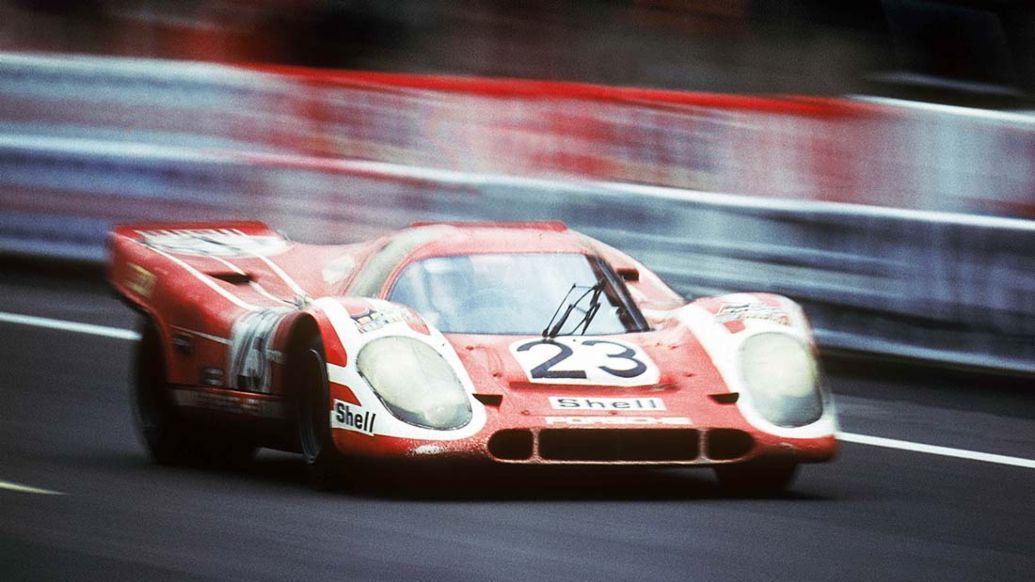Magic Moments in Le Mans – Part 2
Le Mans is not just a technological challenge for teams and drivers. Memories like the ones below highlight how hard it is to win this marathon.

Jacky Ickx
(Born 01.01.1945 in Brussels, BE, four overall wins with Porsche, six in total):
“After three hours we thought we’d lost the race. My 936 was out, and I joined up with Jürgen Barth and Hurley Haywood. But they were having trouble as well. We were in 42nd place. I still can’t get my head around what happened next. It was this euphoric state. I drove the whole night through at top speed, always at the limit. In rain and fog. I just got faster and faster. 42nd, 35th, 28th, 20th, ninth, sixth, fifth. Everyone felt that we could achieve the unimaginable. Jürgen and Hurley drove faster than ever, and the mechanics did an incredible job. I didn’t feel tired at all. Then we took the lead. On Sunday morning I was totally spent. In the end, Jürgen hauled the 936 across the line with only five cylinders. I wouldn’t have been able to. There are a lot of great stories about a lot of races. But 1977 stands out. That was a once-in-a-lifetime thing. Races like that have made Porsche a legend.”
Hans Herrmann
(Born 23.02.1928 in Stuttgart, DE, overall winner with Porsche in 1970):
“I lost to Jacky Ickx in 1969 after we’d spent the last hour and a half overtaking each other several times each lap. In 1970, Ferdinand Piëch ensured that we had a good chance to go for the win with a more powerful engine. Being able to win just a year after losing by a hair’s breadth was, of course, very special. It was also the first overall victory for Porsche – and it was my last race. I announced my retirement from racing after that. I had promised my wife. She had started to press me a year or two before, because of the many friends we had lost. And I knew it myself: there was no reason I should have all the luck, and at some point my luck might run out. It was very moving that all of these factors came together in 1970. I don’t remember if I shed any tears or not. But I certainly could have – I’m pretty emotional.”
Richard Attwood
(Born 04.04.1940 in Wolverhampton, UK, overall winner with Porsche 1970):
“We won under odd circumstances. In February, Helmuth Bott, who was then board member for development, asked me what car I wanted for the 24 Hours of Le Mans. I told him three things: First, I wanted the 4.5-litre 12-cylinder instead of the 5-litre engine, which I thought was less reliable. Second, I wanted the ‘Kurzheck’ (short-tail) version of the 917 because the long-tail version was so fidgety. Third, I wanted Hans Herrmann as my partner, because he knew how you have to pace yourself with the material to get through the long race. I got everything. And then we qualified in 15th. At that moment I thought I had made the biggest mistake of my life. We wouldn’t stand a chance against the 5-litre engines. We weren’t competitive and could only hope that the cars in front of us would have problems. And that’s exactly what happened.”
Peter Falk
(Born 27.11.1932 in Athens, GR, Porsche Race Director at seven overall wins):
“In 1987 at Le Mans we wanted to enter three cars, as always, and had built a fourth 962 as a spare. It was customary in those days for the drivers to test-drive all the cars in Weissach before traveling to France. Hans-Joachim Stuck damaged one of the cars irreparably in the process. So there were only three. That’s what we took to Le Mans. In one of the free practice sessions, Price Cobb had a serious accident with his car. So then there were only two. We started the race with those two cars. After just under an hour, Jochen Mass came into the pit. The engine was kaput. I think a piston burned through. So there was only one … There were still 23 hours to go, almost the entire race, and we had just one iron left in the fire, the 962 of Stuck, Derek Bell, and Al Holbert. The situation was extremely exhausting and exhilarating for me as the race director and the whole team: What would happen with just one car left? It went well. We won.”
Norbert Singer
(Born 16.11.1939 in Eger, Sudetenland, head of the project at nine overall wins):
“Sweeping the podium is a great moment. I was cautious going into the race. The 956 was a completely new car. You can’t go into every race saying, Hurray, we’re going for the win! You have to see how things go – getting through 24 hours is no easy task. This win was perfect and actually somewhat surprising. We had taken our job very seriously. A few years before that we had made a mistake. In 1979, Ernst Fuhrmann was still with Porsche and he said to us engineers, ‘What do you say if we drive Le Mans this year? There’s practically no competition.’ Basically, we just had to show up and walk off with the victory. And what happened? We didn’t reach the finish line with either car – we lost even without competition. You can trip over your own feet as well. Having experienced that, I really enjoyed the win in 1982. The 956 went straight into the museum. It’s the car that hangs from the ceiling.”